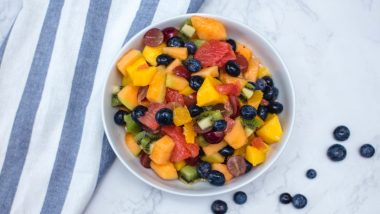Navratri, one of the most significant Hindu festivals, is a nine-night celebration dedicated to the worship of Goddess Durga. During this period, many people observe fasts or restrict their diets as a mark of devotion and to purify their bodies and minds. If you're participating in Navratri fasting in 2023, here's a food guide to help you make the right dietary choices.
What to Eat During Navratri Fasting
- Fruits: A variety of fruits can be consumed during Navratri fasting. Apples, bananas, pomegranates, and oranges are popular choices. They provide essential vitamins, minerals, and energy to sustain you throughout the day.
- Milk and Dairy Products: Milk, yoghurt, and buttermilk are excellent sources of protein and calcium. You can make yoghurt-based smoothies or enjoy a glass of plain or flavoured milk.
- Nuts and Seeds: Almonds, walnuts, cashews, and pumpkin seeds are protein-packed snacks that provide sustained energy during fasting. They are also rich in healthy fats and fibre.
- Buckwheat (Kuttu): Buckwheat is a common ingredient in Navratri fasting recipes. You can make dishes like buckwheat pancakes, kuttu ki puri, and kuttu dosa. It is a good source of carbohydrates and fibre.
- Amarnath (Rajgira): Amarnath flour is used to make rajgira paratha and rajgira ladoo. It's high in protein and gluten-free, making it an ideal choice for fasting.
- Potatoes: Potatoes are a staple during Navratri fasting. You can prepare dishes like vrat ke aloo, aloo jeera, or aloo tomato curry. They provide essential carbohydrates and are versatile in cooking.
- Rock Salt (Sendha Namak): Regular table salt is avoided during fasting, and instead, rock salt is used. It adds flavour to your dishes and is believed to be pure and suitable for fasting. Navratri 2023 Vrat Food Guide: From Sabudana Vada to Kuttu Ki Poori, Watch Recipe Videos of Sattvic Foods To Eat During 9-Day Festival.
What to Avoid During Navratri Fasting
- Grains: Grains like wheat, rice, and oats are typically avoided during Navratri fasting. These grains are substituted with alternatives like buckwheat, water chestnut flour, and amarnath.
- Legumes: Legumes such as lentils, chickpeas, and beans are usually restricted during fasting. This includes dishes like dal and chana masala.
- Non-Vegetarian Foods: Meat, fish, and eggs are strictly prohibited during Navratri fasting as they are considered non-vegetarian.
- Onions and Garlic: Many people abstain from consuming onions and garlic during Navratri as they are believed to generate negative energy.
- Processed Foods: Highly processed foods, including packaged snacks, instant noodles, and canned foods, are best avoided as they may contain ingredients not suitable for fasting.
- Refined Sugar: Refined sugar and foods high in sugar content should be replaced with natural sweeteners like honey or jaggery.
Navratri fasting is not only about dietary restrictions but also a time for spiritual reflection and purification. It's essential to maintain a balanced diet during this period to ensure you receive the necessary nutrients and energy. Always consult with a nutritionist or healthcare provider if you have specific dietary concerns or health conditions before undertaking any fasting regimen. By following these dietary guidelines, you can celebrate Navratri with devotion and good health.
(The above story first appeared on LatestLY on Oct 17, 2023 03:06 PM IST. For more news and updates on politics, world, sports, entertainment and lifestyle, log on to our website latestly.com).













 Quickly
Quickly


